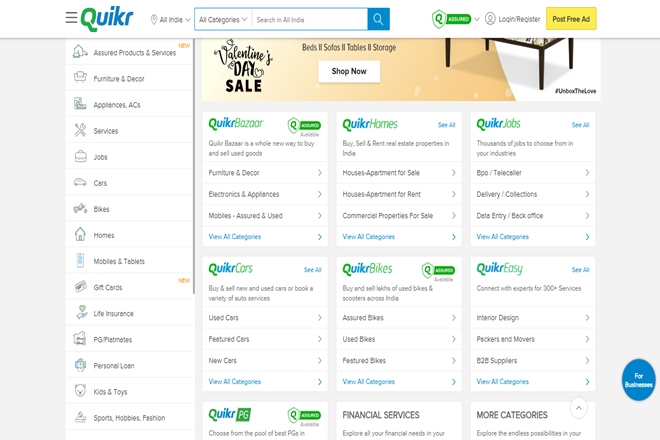Online classifieds startup Quikr, which turned unicorn in 2015, is no more in the hallowed club of companies valued over $1 billion. Swedish investor Kinnevik, which has 17 per cent stake in Quikr, has devalued it by 45 per cent to roughly around $570 million due to the fraud committed by certain dealers and vendors in its managed rentals segment which is the co-living business and the auto segment. “This is a reflection of not only the effect of the uncovered fraud but also the company reducing its footprint within these particular segments as well as a number of amendments to the company’s revenue recognition principles to strengthen the integrity of its reported financials going forward,” said Samuel Sjöström, Head of Strategy, Kinnevik in the Q4 2019 earnings call earlier this month.
The fraud in the two categories had the “dual effect of potentially overstating the value of transactions and revenue generated in these categories while introducing risk on the recoverability of receivables,” Kinnevik said in its year-end release 2019. Quikr, led by Pranay Chulet, has raised $424 million so far across 12 rounds of funding, as per deals tracker Crunchbase. Kinnevik has been investing in Quikr since 2014 when the company raised its $90 million Series F round followed by $122 million Series H round in 2015 from Kinnevik and Tiger Global. Kinnevik had also led the $60 million round in 2015 in Quikr and was last valued at reportedly around $1.5 billion. Kinnevik’s total investment in Quikr stood at $105.4 million so far, as per while the fair value of its 17 per cent stake as on December 31, 2019, was $96.4 million from $168 million as on December 31, 2018, according to the financials in the release.
Also read: Ritesh Agarwal’s OYO inches closer to profitability in India but no ‘deadline’ yet to hit milestone
Kinnevik’s CEO Georgi Ganev said that “no one in the C-suite or the level below” have been into the fraudulent activities even as the company has “laid off a lot of their workforce, basically, half of the workforce in order to become profitable faster and not dependent on funding. Which is, of course, something that we appreciate,” he added. The company had laid off around 1,000 out of its 3,000 employees last week, as per media reports.
Sjöström said the valuation of Quikr is now based on “forward-looking net revenue multiples” instead of the discounted cash flow analysis as it focuses on the company upcoming FY21. 2021. By doing this, Kinnevik based the valuation on Quikr “on a near-term budget instead of longer-term projections and also make our valuation of Quikr increasingly linked to the trading of its publicly listed peers,” he added. The company as caution has “reduced its footprint in these segments (co-living and auto)” even as it strengthened “internal operational controls to prevent recurrence” and take legal action against the culprits.
While Ganev admitted that business frauds could happen to any company but he stressed on the higher risk level in less mature markets like India. “In a very unstructured market such as India, where you deal with a high number of small dealers, of course, this is more kind of risky than in a more mature market,” said Ganev.

